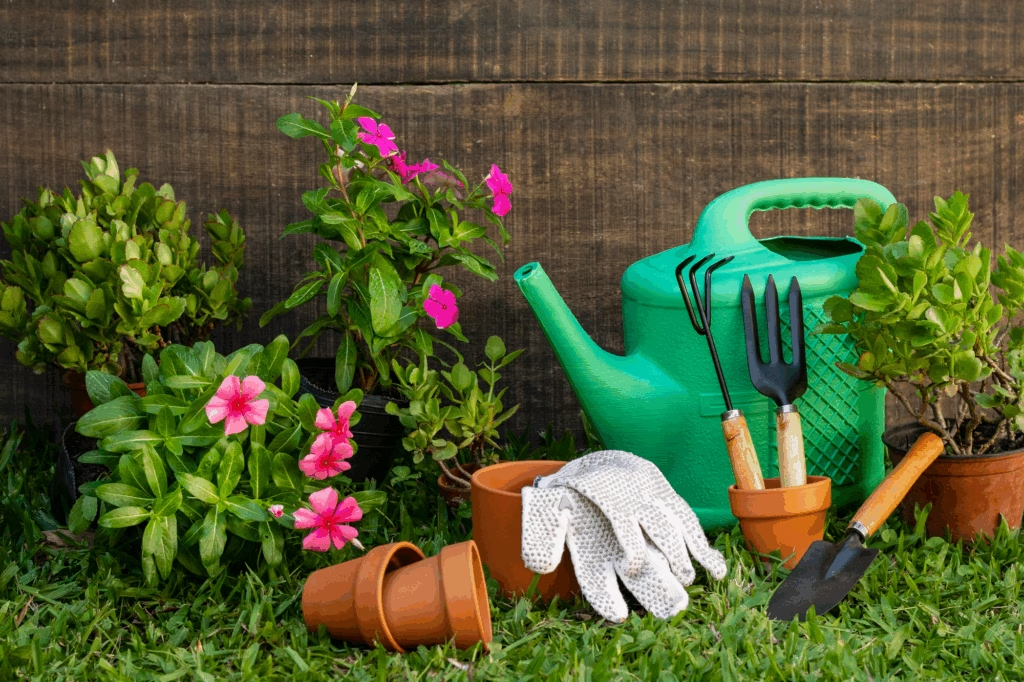Introduction
Maintaining a garden can feel overwhelming, especially when juggling work, family, or other responsibilities. However, with seasonal garden maintenance strategies, you can keep your garden healthy and vibrant without spending hours every day. By planning ahead and adjusting your care routine according to the seasons, you reduce stress while maximizing growth and productivity.

This guide provides practical tips for year-round garden care, from spring planting to winter preparation, helping you save time and enjoy a thriving outdoor space.
1. Spring: Prepare and Revive Your Garden
Spring is the season of renewal, making it the perfect time to prepare your garden for the growing months.
Key tasks:
- Clean up debris: Remove dead leaves, broken branches, and old mulch to reduce pests and disease.
- Soil preparation: Test soil pH and add compost or organic fertilizer to replenish nutrients.
- Pruning: Trim dead or overgrown branches from shrubs and perennials.
- Planting: Sow seeds for annuals, vegetables, and flowers. Focus on early-season crops like lettuce, spinach, radishes, and pansies.
Hack: Start seedlings indoors to get a head start on the growing season and reduce the risk of frost damage.
2. Summer: Water Wisely and Control Pests
Summer is the peak growing season, and maintaining consistent care is essential.
Time-saving strategies:
- Watering: Use drip irrigation, self-watering containers, or soaker hoses to deliver water efficiently and reduce evaporation.
- Mulching: Apply mulch around plants to conserve moisture and suppress weeds.
- Pest management: Inspect plants regularly for aphids, caterpillars, and whiteflies. Use organic sprays like neem oil and introduce beneficial insects like ladybugs.
- Deadheading: Remove spent flowers to encourage continuous blooming without replanting.
Tip: Group plants with similar water needs together to simplify irrigation and avoid over- or under-watering.
3. Fall: Clean, Protect, and Plan Ahead
Fall is the perfect time to prepare your garden for winter and plan for the next year.
Essential tasks:
- Harvest: Gather remaining vegetables and fruits before frost.
- Soil care: Add compost or manure to replenish nutrients and improve soil structure.
- Pruning and cutting back: Remove dead perennials and trim shrubs lightly to prevent disease over winter.
- Plant bulbs: Plant spring-flowering bulbs like tulips, daffodils, and crocuses now.
- Protect sensitive plants: Cover tender plants or move potted plants indoors to avoid frost damage.
Hack: Collect seeds from healthy plants for next season to save money and maintain plant varieties you love.
4. Winter: Minimal Maintenance for Maximum Impact
Even in winter, your garden needs attention, though less frequently.
Time-saving winter care tips:
- Inspect plants: Check for damage, pests, and diseases during mild days.
- Prune dormant trees and shrubs: Prune to shape trees and remove dead wood while they are dormant.
- Protect soil: Apply mulch to prevent erosion and retain nutrients.
- Plan and prepare: Review what worked during the year and plan next year’s planting schedule.
Tip: Use this downtime to sharpen tools, organize seeds, and schedule spring planting activities in advance.
5. Tools and Equipment: Save Time with the Right Gear
Using the right tools makes garden maintenance faster and easier:
- Pruning shears for precise trimming
- Wheelbarrow or garden cart to move soil and compost efficiently
- Soaker hoses or drip irrigation systems for automatic watering
- Mulching tools for quick coverage of soil beds
Hack: Keep all tools in a dedicated garden shed or storage bin to avoid wasting time searching for them.
6. Soil Health: A Year-Round Priority
Healthy soil reduces maintenance and improves plant growth.
- Test your soil at least once a year to adjust pH and nutrient levels.
- Rotate crops in vegetable beds to prevent nutrient depletion.
- Use compost and organic fertilizers for consistent soil enrichment.
Tip: Healthy soil reduces the risk of disease, meaning fewer interventions and less stress.
7. Mulching: The Stress-Relief Hack
Mulching is one of the most effective ways to save time and maintain plant health:
- Reduces weeds that require constant attention
- Conserves soil moisture, reducing watering frequency
- Regulates soil temperature, protecting roots from heat and frost
Types of mulch: shredded leaves, straw, wood chips, or bark. Apply 2–3 inches around plants, avoiding stems to prevent rot.
8. Pest and Disease Management: Prevention Over Reaction
Regular monitoring and preventative measures save time over reactive treatments.
- Rotate crops and practice companion planting to naturally reduce pests.
- Keep garden beds clean of debris where pests may hide.
- Introduce beneficial insects and birds to maintain ecological balance.
Hack: Early detection is key—spend a few minutes weekly inspecting plants to prevent major infestations.
9. Efficient Watering Techniques
Watering is often the most time-consuming gardening task.
- Group plants with similar needs together to simplify watering.
- Water deeply and less frequently to encourage strong root growth.
- Use rainwater harvesting systems to reduce trips to the tap.
- Consider self-watering containers for high-maintenance plants.
Tip: Use mulch alongside these techniques for maximum water efficiency.
10. Seasonal Fertilization: Minimal Effort, Maximum Results
Fertilizing plants according to the season improves growth without overworking your garden:
- Spring: Apply balanced organic fertilizer to jumpstart growth.
- Summer: Use high-potassium fertilizers for flowering and fruiting plants.
- Fall: Add compost and slow-release fertilizer to prepare for winter.
- Winter: Minimal fertilization; focus on soil enrichment for next season.
Hack: Slow-release fertilizers reduce the need for frequent feeding.
11. Garden Organization: Reduce Stress
A well-organized garden saves time and prevents frustration:
- Label plants and seed rows for easy identification.
- Keep a gardening calendar with seasonal tasks and reminders.
- Organize garden tools and fertilizers in labeled containers.
Tip: Planning ahead prevents rushed planting, watering, or harvesting, reducing stress significantly.
12. Companion Planting for Year-Round Benefits
Companion planting reduces maintenance and boosts productivity:
- Marigolds near vegetables repel pests.
- Basil with tomatoes improves flavor and reduces pests.
- Nasturtiums act as a trap crop, protecting nearby plants from aphids.
This natural approach saves time, money, and effort in managing pests.
13. Low-Maintenance Plants for Year-Round Beauty
Incorporate plants that require minimal care but add color and structure to your garden:
- Perennials like coneflowers, hostas, and daylilies
- Drought-tolerant shrubs like lavender or rosemary
- Ground covers like creeping thyme to suppress weeds
Hack: Focus on plants suited to your climate to minimize watering and maintenance needs.
14. Seasonal Cleanup Shortcuts
Regular but small cleanup tasks prevent overwhelming maintenance sessions:
- Weekly weeding prevents overgrowth
- Remove dead flowers and leaves to improve airflow and reduce pests
- Use compost bins to recycle garden waste efficiently
Tip: Short, consistent maintenance sessions are more effective than long, infrequent efforts.
15. Time-Saving Seasonal Tips Summary
- Spring: Prepare soil, plant seeds, prune lightly.
- Summer: Mulch, water efficiently, deadhead flowers.
- Fall: Harvest, protect plants, plant bulbs.
- Winter: Minimal watering, prune dormant plants, plan ahead.
Using this seasonal approach ensures you spend less time worrying about your garden and more time enjoying it.
Conclusion
Seasonal garden maintenance is about working smarter, not harder. By planning tasks according to the seasons, choosing low-maintenance plants, and using time-saving techniques like mulching, drip irrigation, and companion planting, you can enjoy a thriving garden year-round with minimal stress.
Remember, a well-planned and organized garden reduces frustration, saves time, and keeps plants healthy. With these seasonal garden maintenance tips, you can maintain beauty and productivity while enjoying your outdoor space more.
Call to Action: Want to make garden maintenance easier? Visit Agzora.com for expert gardening tips, seasonal planting guides, and eco-friendly tools designed to simplify year-round garden care.





